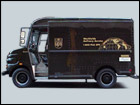
NEW YORK (CNN/Money) -
United Parcel Service and the Teamsters union reached a tentative agreement that will add union jobs while giving the world's largest transportation company the labor peace it lacked on its previous contract.
The agreement, reached Monday evening, comes a little more than two weeks before the Aug. 1 contract expiration, giving UPS customers peace of mind that their shipments will not be disrupted. The previous five-year agreement was reached after a 15-day strike in 1997 that was the first national work stoppage at the parcel delivery company.
The agreement still needs rank-and-file ratification but that is not expected to be difficult with the negotiating committee unanimously endorsing the pact.
Shares of UPS (UPS: unchanged at $60.50, Research, Estimates) were slightly higher in afternoon trading Tuesday.
About 210,000 Teamsters at Atlanta-based UPS will see pay increases averaging $5 an hour during life of the six-year pact, on top of the current top pay of about $23 an hour. That works out to an average annual pay increase of a bit more than 3 percent a year, and a total pay increase of about 22 percent. There are also cost-of-living raises if inflation increases by more than 3 percent a year.
Wages and benefit costs will rise about an average of $8.45 an hour during the life of the contract, but analysts said that reaching the agreement will help stop the flow of freight to UPS competitors by customers worried about a possible disruption. Both UPS and FedEx Corp. had reported seeing some shift in business in June.
"We have noted in the past that our third-quarter earnings per share estimate of 47 cents (versus First Call consensus of 57 cents) would probably be too low if UPS settled early and a second round of freight diversion did not occur," wrote Bear Stearns analysts Ed Wolfe. "As a result of last night's announcement, we will likely be raising our third-quarter EPS estimate in the next few days, once we get better visibility about some details of the contract."
Greg Burns, analyst for J.P. Morgan Chase, said he's not too worried about talk about the contract giving union members a significantly bigger lift than past deals.
| |
 Related stories
Related stories
| |
| | |
| | |
|
"I don't think it's too rich, but I don't have proof of that until I see all the details. Right now only the union is talking," Burns said. "But UPS needed a deal and it needed an early one."
Teamsters General President Jimmy Hoffa, son of the former union boss, said that the union agreed to a longer-than-normal deal in order to have all pay increases included in base pay rather than as a bonus that wouldn't lift future wages. He said that the company's agreement to convert about 10,000 part-time employees to full-time jobs during the life of the contract, as well as shift 10,000 positions now held by outside contractors to union-represented company jobs was a major win for union negotiators. About 58 percent of the Teamsters at UPS are classified as part-time employees.
"It's common now to walk into a UPS plant and see people who are working who don't work for UPS," he said. "We believe under the roof of a UPS plant we should have wall-to-wall Teamsters.
UPS CEO Mike Eskew, appearing at a joint press conference with Hoffa, said the agreement will give the company the flexibility it needs to grow its business.
Click here for a look at transportation stocks
Revenue at UPS rose 3 percent last year to $30.6 billion, despite the slowing of the U.S. economy, following 10 percent growth in 2000. Analysts surveyed by earnings tracker First Call expect the company to have revenue growth of 4.4 percent this year and nearly 6 percent growth next year.

|

